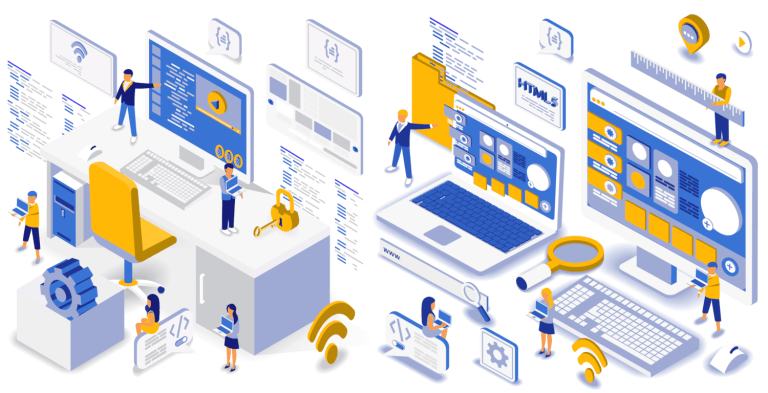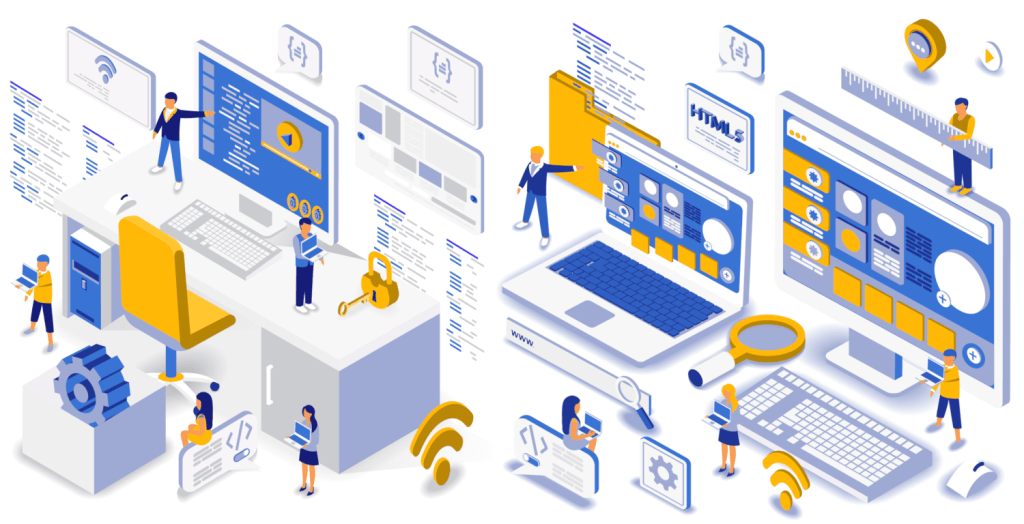Definition of Corporate Software Development
Corporate software development is all about designing, creating, and deploying software solutions specifically tailored to the complex needs of businesses and organisations. Unlike generic, off-the-shelf software, corporate software is built to support and enhance the unique operations, processes, and goals of a company. This type of software is often central to a business’s core functions, providing essential tools for managing resources, improving efficiency, and driving growth.
Types of Corporate Software
Corporate software is essential for boosting efficiency and streamlining operations in business management. It covers everything from handling customer relationships to improving resource planning and utilising data insights effectively. These software solutions centralise data, automate tasks, and offer valuable insights that guide decision-making and improve overall performance. Understanding these different types of corporate software is crucial for businesses looking to utilise technology effectively, meet strategic goals, and stay competitive in today’s fast-paced market environment.
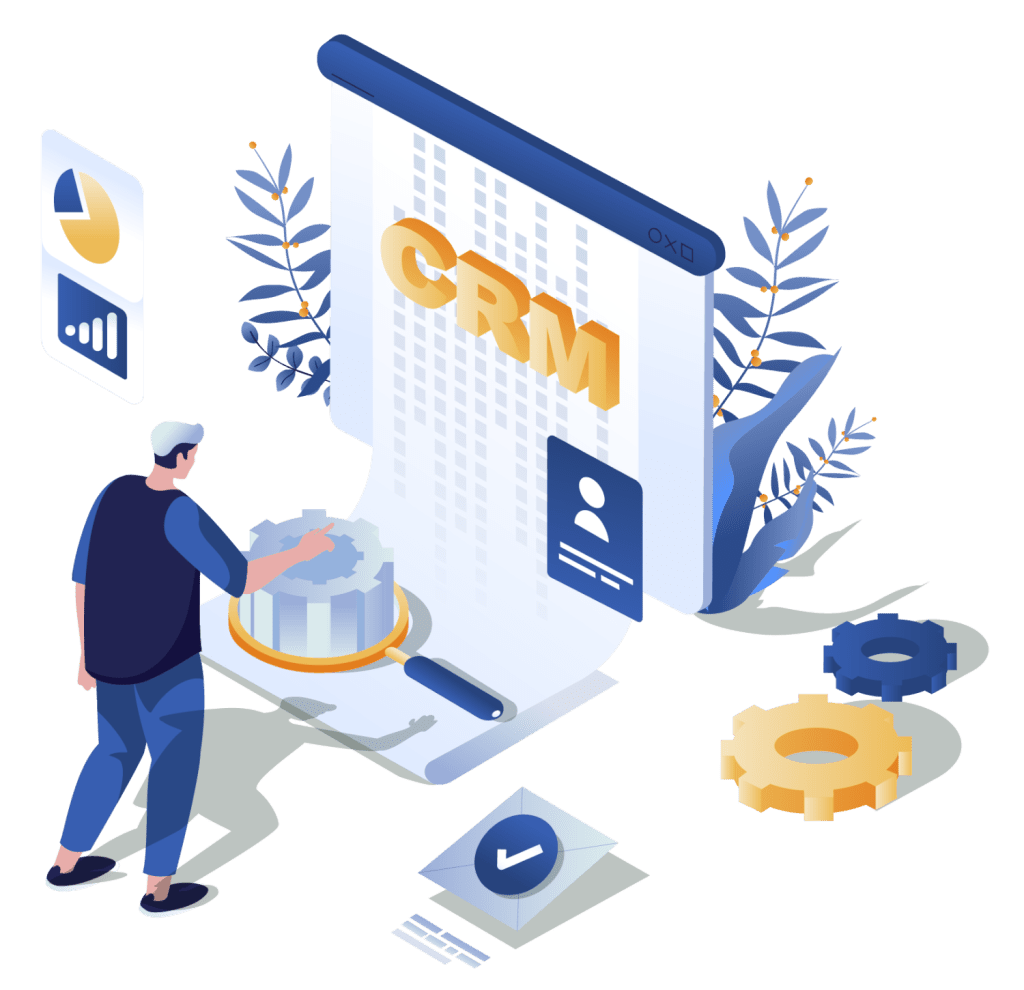
Customer Relationship Management (CRM)
CRM systems help businesses manage their interactions with current and potential customers. These systems centralise customer data, track sales interactions, and support marketing efforts. By leveraging CRM systems, companies can improve customer service, enhance sales performance, and foster stronger customer relationships, leading to increased customer satisfaction and loyalty.
Enterprise Resource Planning (ERP)
ERP systems are comprehensive software solutions designed to integrate and manage all the core processes of a business. Furthermore, these systems enable organisations to streamline their operations by providing a unified platform for finance, human resources, supply chain management, manufacturing, and more. By consolidating data and processes, ERP systems improve efficiency, enhance decision-making, and facilitate better resource management.
Business Intelligence (BI) Tools
BI tools analyse data and provide actionable insights. These tools enable businesses to make informed decisions by transforming raw data into meaningful information through reporting, data visualisation, and advanced analytics. BI tools help organisations identify trends, monitor performance, and uncover opportunities for growth and improvement.
Human Resources Management Systems (HRMS)
HRMS are specialised software solutions that assist with managing an organisation’s human resources functions. These systems cover a wide range of activities, including recruitment, onboarding, payroll, performance management, and employee engagement. By automating HR processes and centralising employee data, HRMS solutions help businesses improve efficiency, ensure compliance, and enhance employee satisfaction.
Custom Applications Tailored to Specific Business Needs
All the aforementioned types of software are developed for specific niches or industries, making them tailored to those particular areas. These solutions are available as off-the-shelf products that a corporate company can purchase or license. However, they remain generic within their respective niches or industries and may not always fulfil the unique needs of an individual company. This is where custom or bespoke software becomes essential.
Custom applications are software solutions developed to address the unique requirements of a particular corporation, business, or organisation. Moreover, these applications are designed to support specific processes, workflows, or objectives that cannot be adequately met by ready-made software. Custom applications offer the flexibility to integrate with existing systems, scale with the business, and provide a competitive edge through tailored functionality.
How We Can Help: Custom Software Solutions from BSPOKE Software
BSPOKE Software bring over a decade of experience in crafting custom applications for a wide range of companies across various industries. Our deep expertise, especially in the manufacturing sector, enables us to understand the unique challenges and requirements of our clients. We pride ourselves on delivering robust, scalable, and innovative software that drives efficiency, productivity, and growth.
Our team of skilled developers and industry experts works closely with you to design and implement software that aligns perfectly with your business goals. Whether you’re looking to streamline your operations, enhance customer interactions, or embark on a comprehensive digital transformation, BSPOKE Software is here to help.
We invite you to reach out for a free consultation. Let’s discuss how our custom software solutions can transform your business and give you a competitive edge. Contact us today to get started on your journey towards seamless and efficient operations.
The Importance of Custom Software Development in Corporate Settings
Custom software development enables businesses to address their unique challenges and opportunities with precision and effectiveness. By creating applications that align perfectly with the company’s operations, workflows and processes. While there are numerous benefits to custom software development, three key areas stand out as particularly impactful:
Addressing Unique Business Needs
Every business has unique processes and goals that require specific software solutions. Custom software development creates applications tailored to fit the precise requirements of a business, addressing these unique needs. This ensures that the software aligns perfectly with the company’s operations, enhancing overall efficiency and effectiveness.
Enhancing Efficiency and Productivity
Custom software development plays a crucial role in enhancing efficiency and productivity by streamlining workflows and automating repetitive tasks. Tailored applications can integrate separate systems, reduce manual data entry, and eliminate bottlenecks in business processes. Automation frees up employees to focus on higher-value tasks, leading to increased productivity and operational efficiency.
Competitive Advantage
Investing in custom software development can provide businesses with a significant competitive advantage. Moreover, bespoke solutions are designed to address specific needs that ready-made software cannot, allowing companies to innovate and differentiate themselves from competitors. Custom software can enhance customer experiences, improve operational efficiency, and enable the development of new products or services.
Differentiating Corporate Software from Other Types of Software
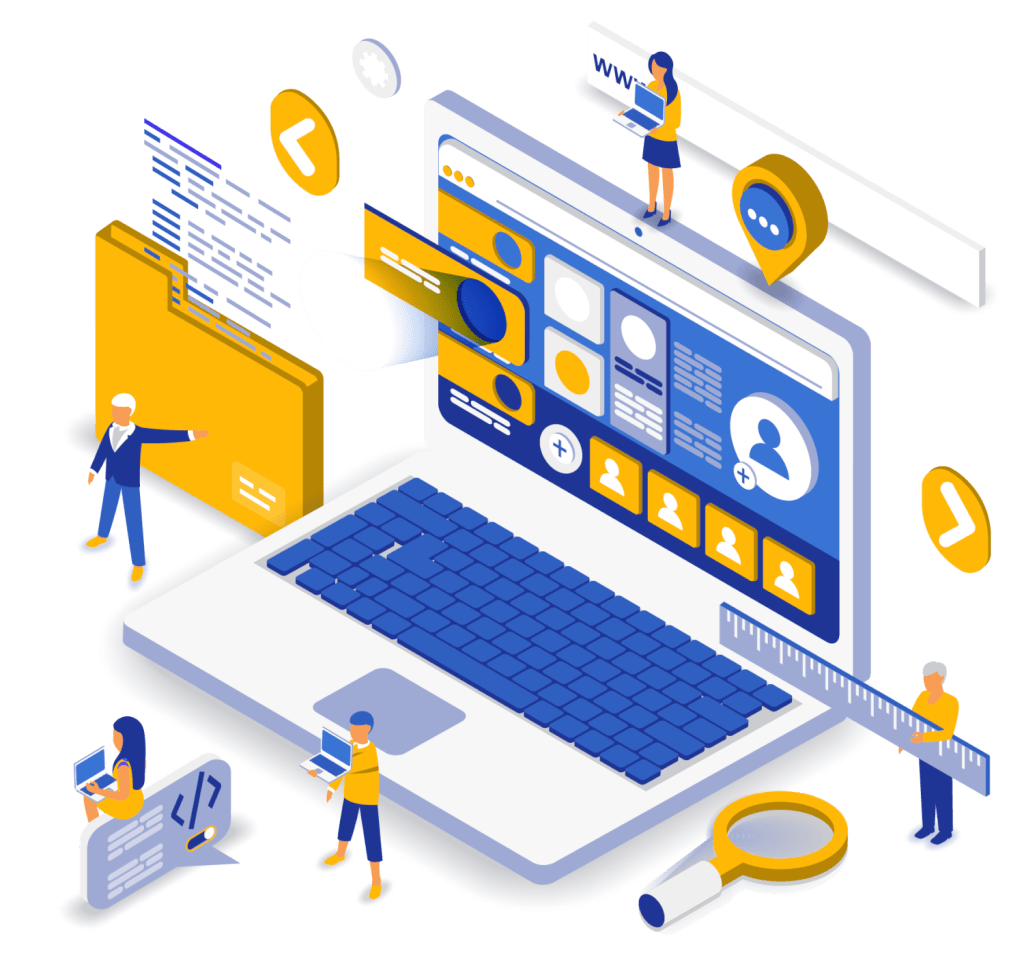
While all software aims to solve problems and improve efficiency, corporate software stands apart due to its scale, complexity, and customisation. Corporate software designs specifically target businesses, addressing complex workflows and large-scale operations. Unlike consumer software for individual users, corporate software integrates deeply with existing systems and processes. Here are key differences between corporate and consumer software:
Purpose and Functionality:
- Corporate Software: Designed to meet the specific needs of a business. It includes features and functionalities that address complex business processes and workflows, such as Enterprise Resource Planning (ERP), Customer Relationship Management (CRM), and custom-built applications tailored to unique business requirements.
- Consumer Software: Created for individual users or general public use. Examples include mobile apps, games, and personal productivity tools. These are typically standardised, with a broad appeal to meet common user needs.
Customisation:
- Corporate Software: Highly customisable to fit the precise requirements of a business. This ensures that the software integrates seamlessly with existing systems and supports the unique processes and objectives of the company.
- Consumer Software: Generally, less customisable and designed for a wide audience. Users may have limited options to adjust settings or personalise the experience.
Scale and Complexity:
- Corporate Software: Built to handle large volumes of data and users, with robust security and scalability features. It often supports multiple departments and integrates with various other systems within the organisation.
- Consumer Software: Typically designed for individual or small-scale use, with less emphasis on handling extensive data or integrating with other systems.
Development and Deployment:
- Corporate Software: The development process is often more rigorous and collaborative, involving detailed requirement gathering, iterative development, and thorough testing to ensure reliability and performance. Typically deployed in stages, providing extensive support and training to ensure smooth adoption.
- Consumer Software: Development cycles may be shorter, with a focus on rapid release and user feedback. Deployment is usually straightforward, with updates pushed to users via app stores or online platforms.
The Agile Software Development Lifecycle
The Corporate Software Development Approach
Corporate software development benefits most from the Agile approach to software development. This approach covers five main stages: planning, development, testing, review, and launch. Throughout these stages, the development team works closely with business stakeholders to ensure the final product meets the organisation’s goals and provides the needed value. This method ensures that everything, from initial analysis and design to ongoing maintenance, is well-managed for a successful project.
The first 4 phases of the cycle may have already repeated several times before the initial launch phase begins. This allows the development team to refine the software and ensure it meets all requirements. After the launch, the cycle may repeat to continually improve the software. This ongoing process of planning, development, testing, review, and launch is beneficial because it allows the software to evolve based on user feedback and changing needs. Regular updates and improvements keep the software relevant and effective. This approach works particularly well with an hourly rate billing method for corporate software development, as it provides flexibility for ongoing changes and enhancements, ensuring that clients only pay for the work that is done.
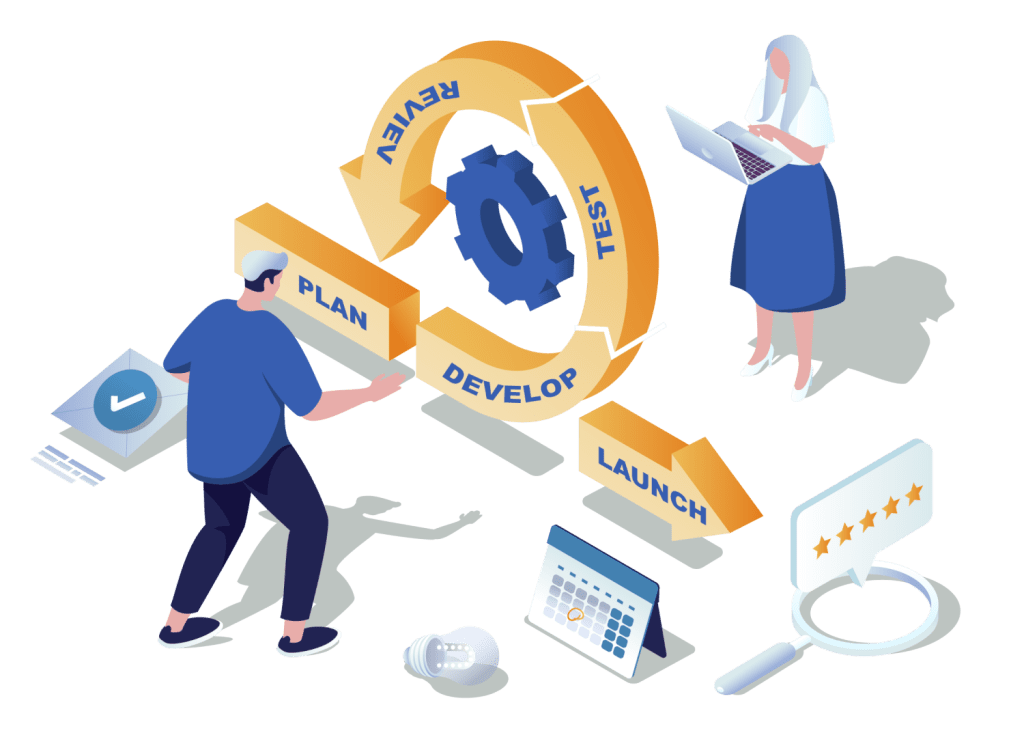
Agile Lifecyle Phase 1) PLAN
In the planning stage, everyone gets together to figure out the project’s goals, scope, and requirements. Additionally, they outline what the project is all about, set a timeline, list the resources they will need, and identify any potential risks. This phase involves creating detailed project plans, marking key milestones, and setting up how development teams and stakeholders will communicate throughout the project.
Agile Lifecyle Phase 2) DEVELOP
Once a solid plan is in place, it’s time to start programming. Developers begin writing the software based on the specifications and designs agreed on earlier. This phase includes setting up the development environment, building databases, and integrating the necessary technologies. Teams use collaboration and version control tools to keep everything organised and ensure everyone remains on the same page.
Agile Lifecyle Phase 3) TEST
Testing is all about ensuring the software works as it should. Testers check for bugs and issues, errors, and security holes. Various types of testing methods include unit testing, integration testing, system testing, and user acceptance testing. The goal is to ensure the software meets all requirements and offers a smooth experience for users.
Agile Lifecyle Phase 4) REVIEW
In the review stage, the software is evaluated by stakeholders, including clients and end-users. Developers conduct code reviews to maintain high-quality standards and ensure best practices are followed. Feedback gathered during this stage helps identify areas for improvement, fix any lingering issues, and make necessary adjustments to enhance the software’s functionality and performance.
Agile Lifecyle Phase 5) LAUNCH
The launch stage officially releases the software to users. This involves deploying it to a live environment and making it available to the intended audience. Preparations include finalising documentation, setting up user support, and ensuring the infrastructure can handle the expected traffic. After launch, performance is monitored to address any immediate issues, and start planning for future updates or enhancements.
Conclusions
Corporate software development is a cornerstone of business transformation in today’s digital age. It plays a critical role in enabling companies to streamline operations, enhance productivity, and maintain a competitive edge. By integrating advanced technologies and custom solutions, businesses can efficiently manage their resources, improve customer relationships, and make data-driven decisions. Moreover, as digital transformation increasingly becomes essential, businesses cannot overstate the importance of robust, tailored software solutions. They are not just tools but strategic assets that drive innovation and growth.
The journey of digital transformation is unique for every business, and custom corporate software solutions are key to navigating this path successfully. Unlike one-size-fits-all software, custom applications are designed to meet the specific needs and goals of a business, providing unmatched flexibility, efficiency, and integration. These solutions help businesses overcome unique challenges, optimise their processes, and deliver exceptional value to their customers.
Investing in custom software development means investing in a future where your business can adapt quickly to market changes, scale operations effortlessly, and continuously innovate. The benefits of such bespoke solutions extend beyond immediate gains, laying a foundation for sustained competitive advantage and long-term success. At BSPOKE Software, we understand the transformative power of custom software. With over a decade of experience, especially in the manufacturing sector, we commit to assisting businesses in unlocking their full potential through tailored software solutions. Reach out to us for a free consultation and discover how we can support your digital transformation journey.
